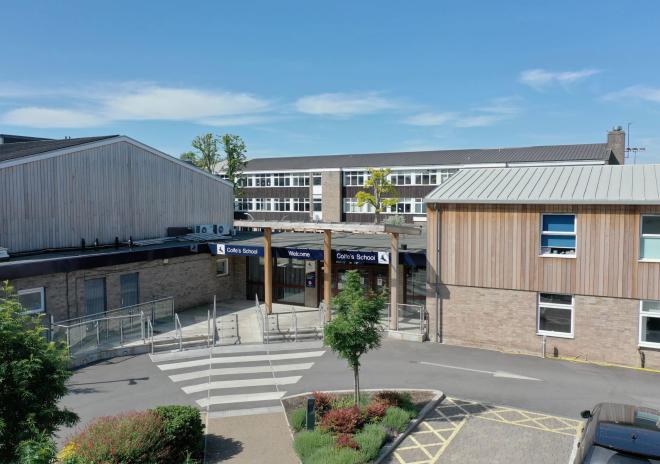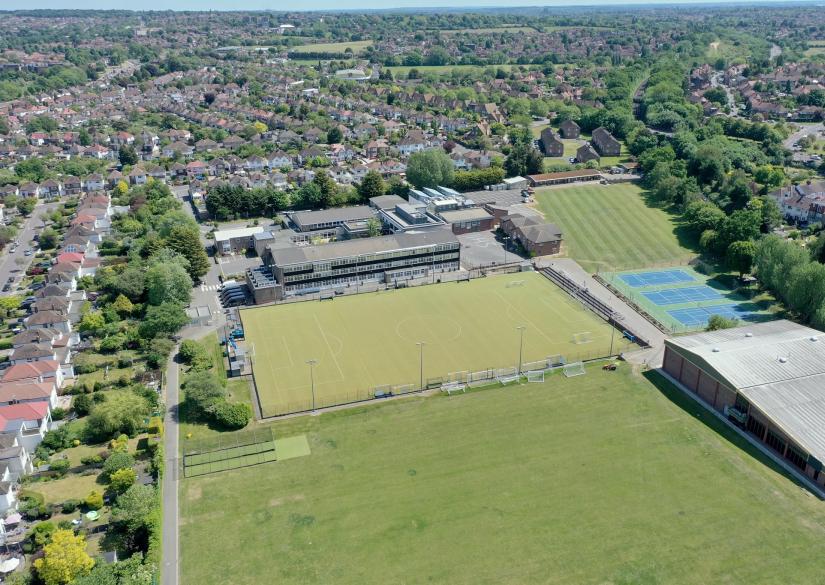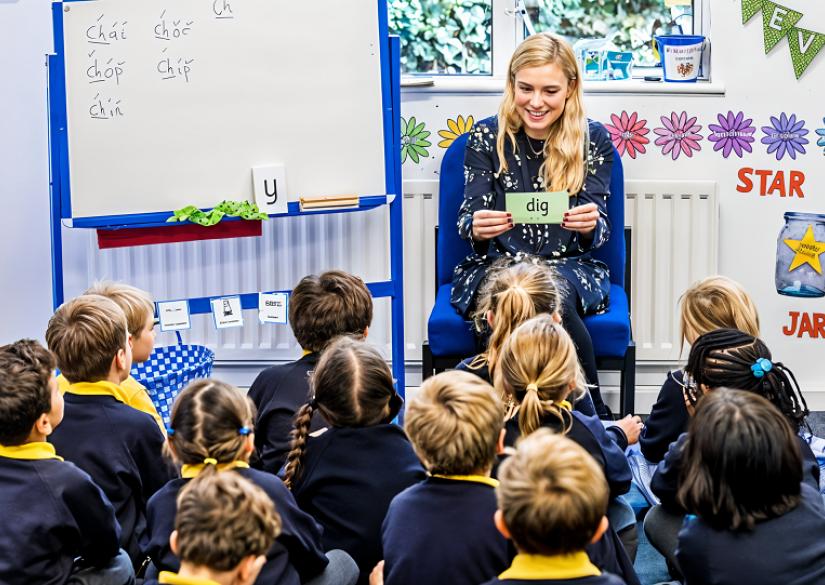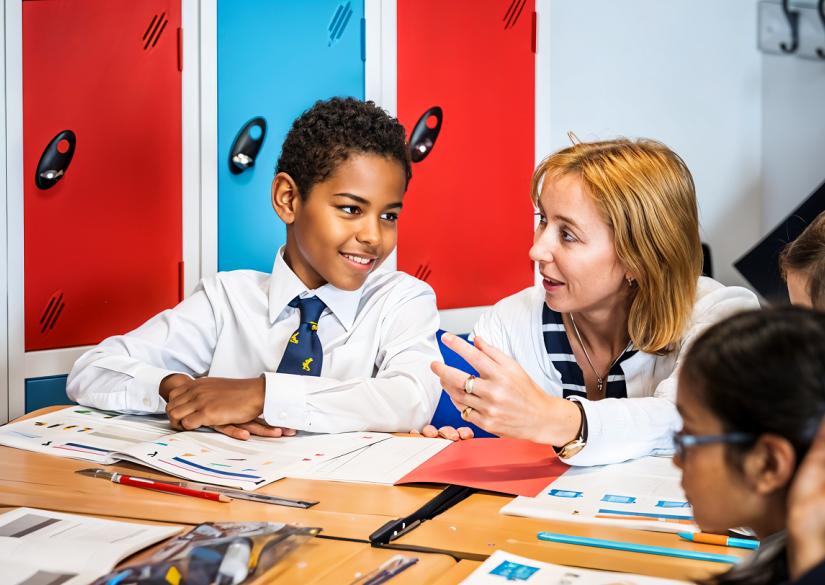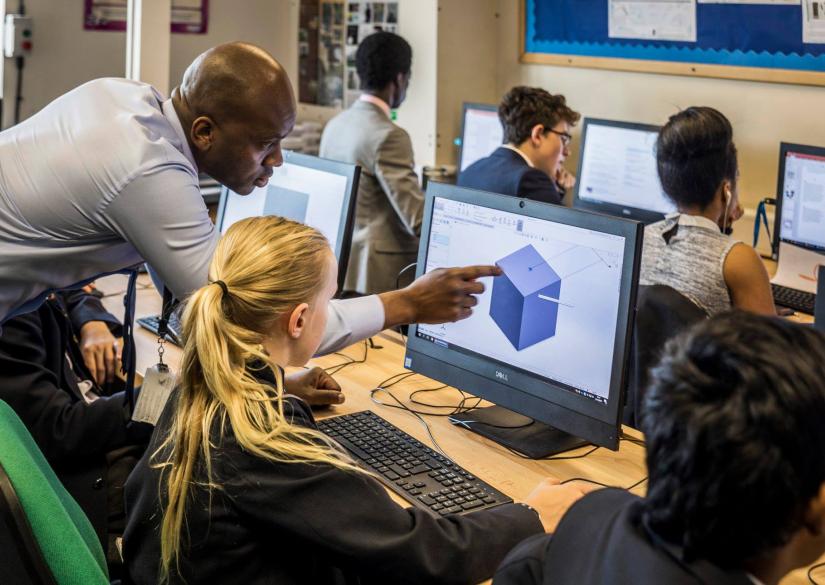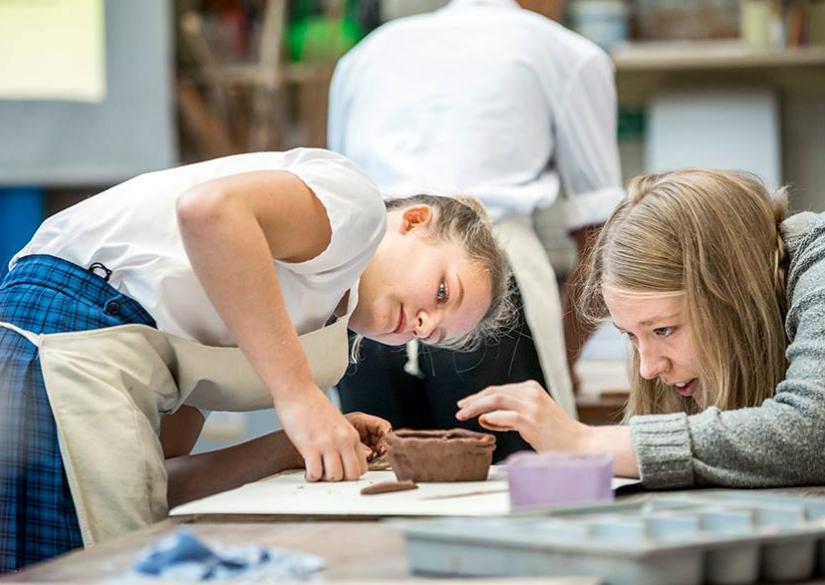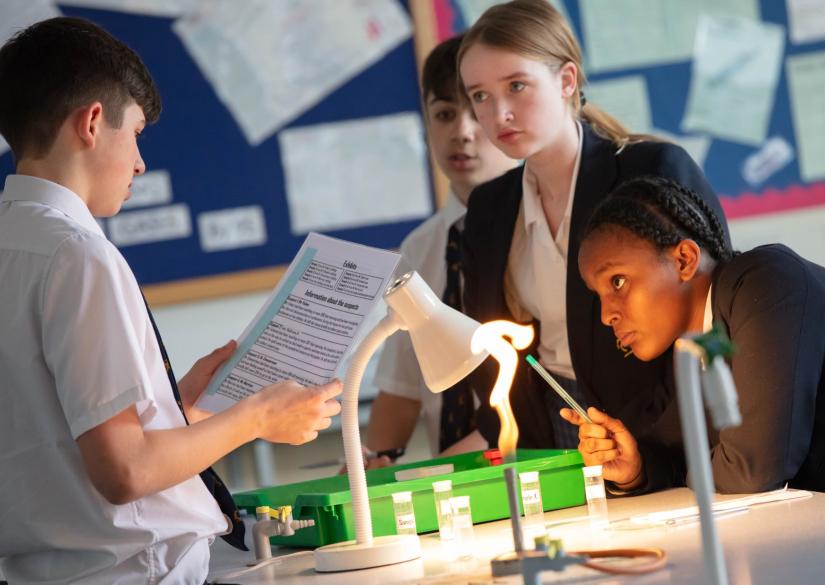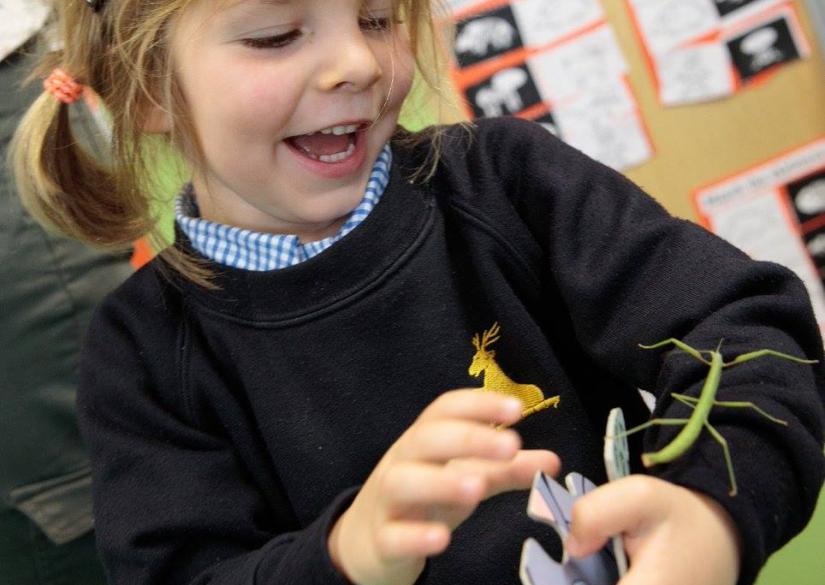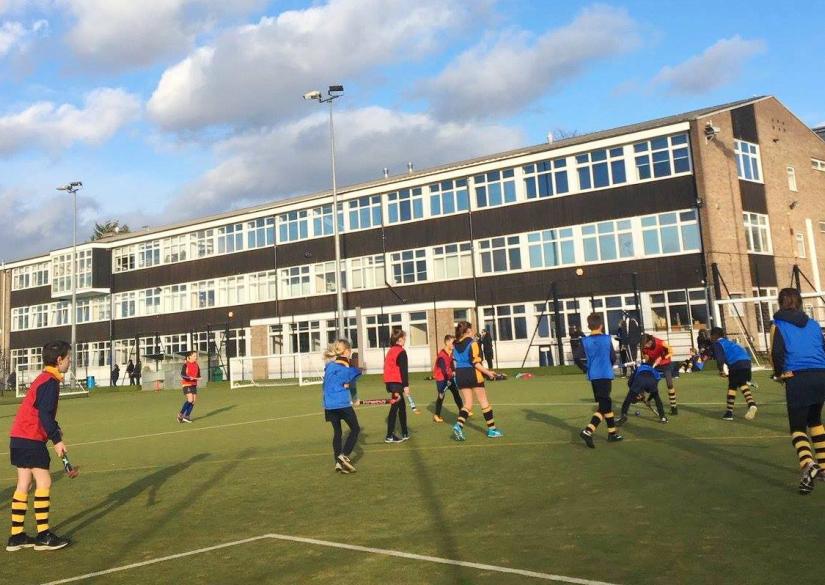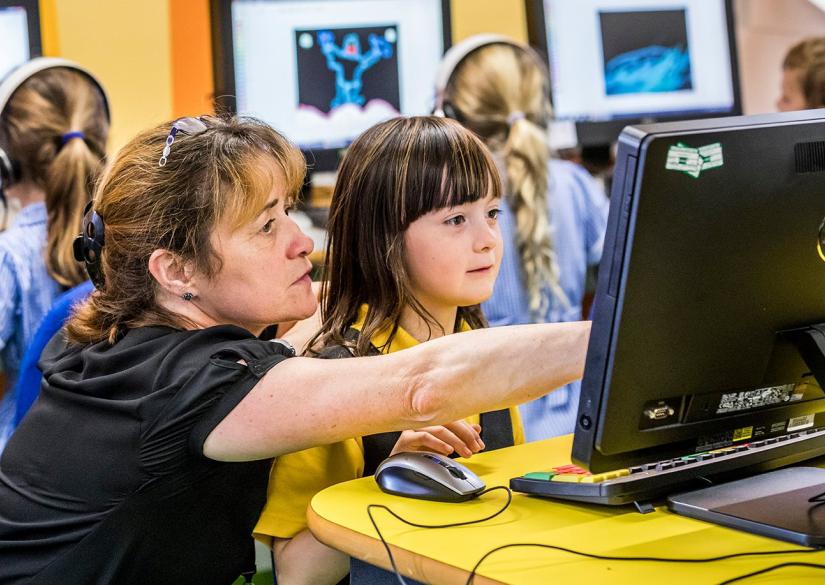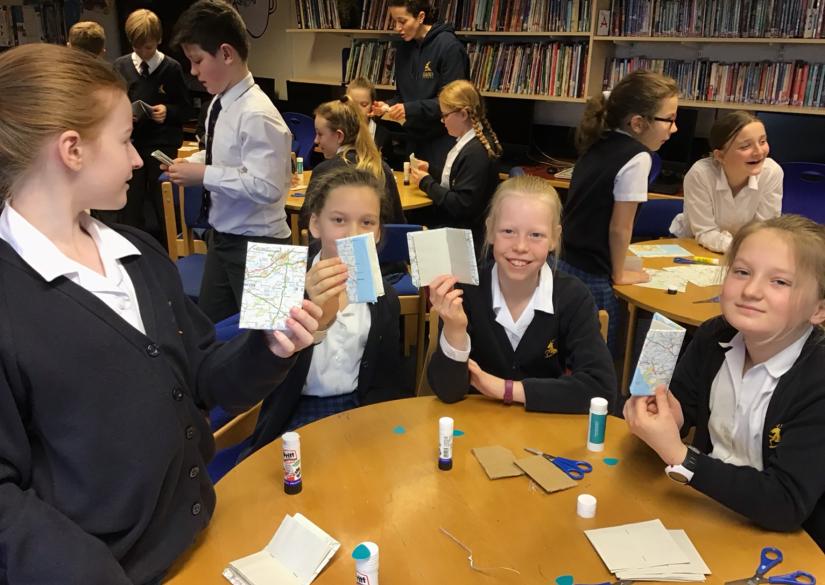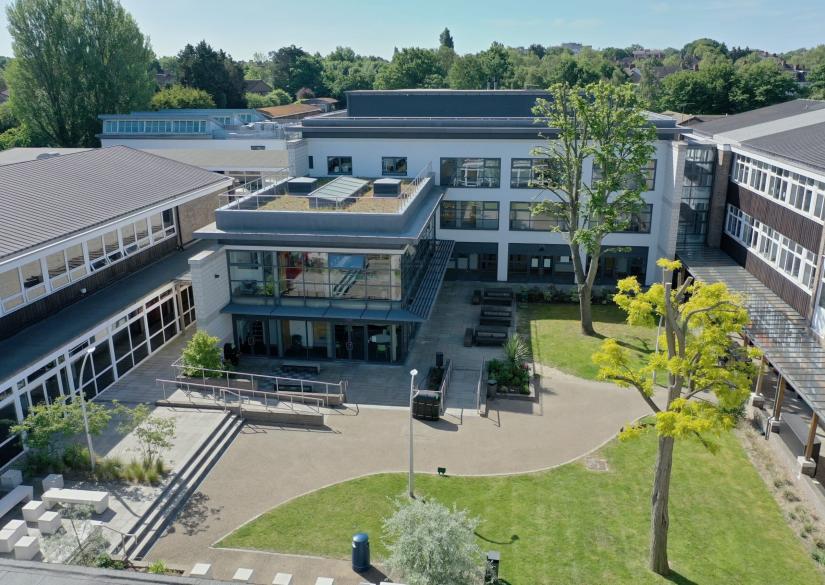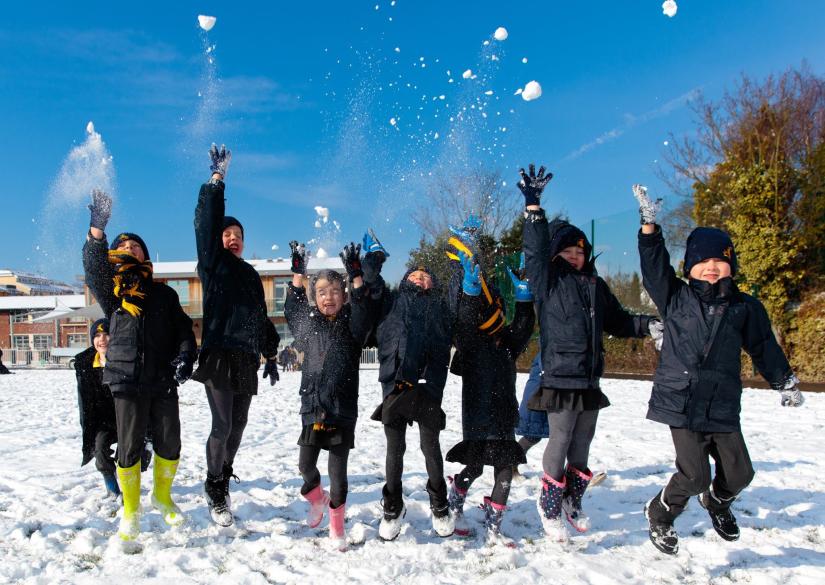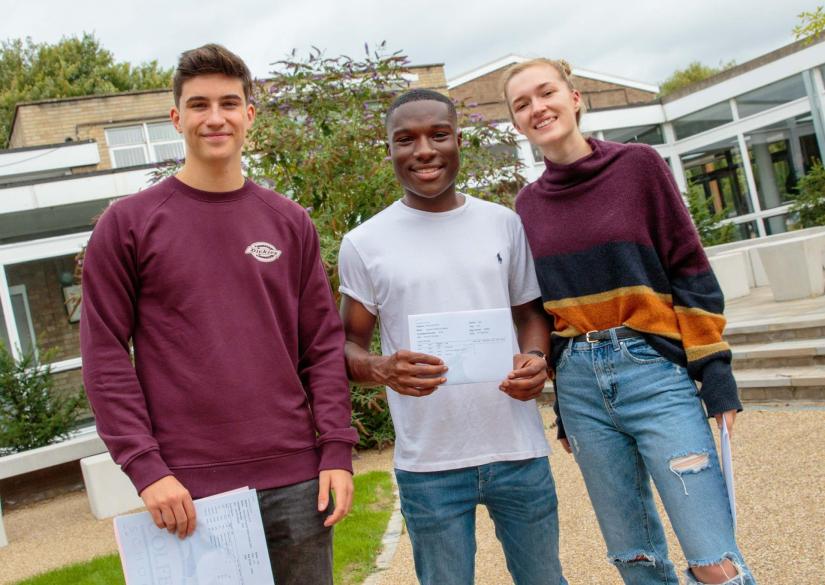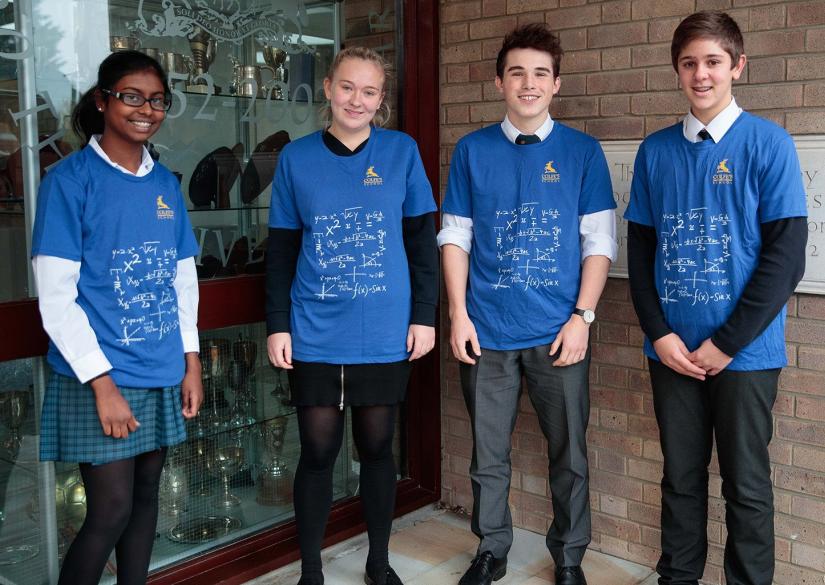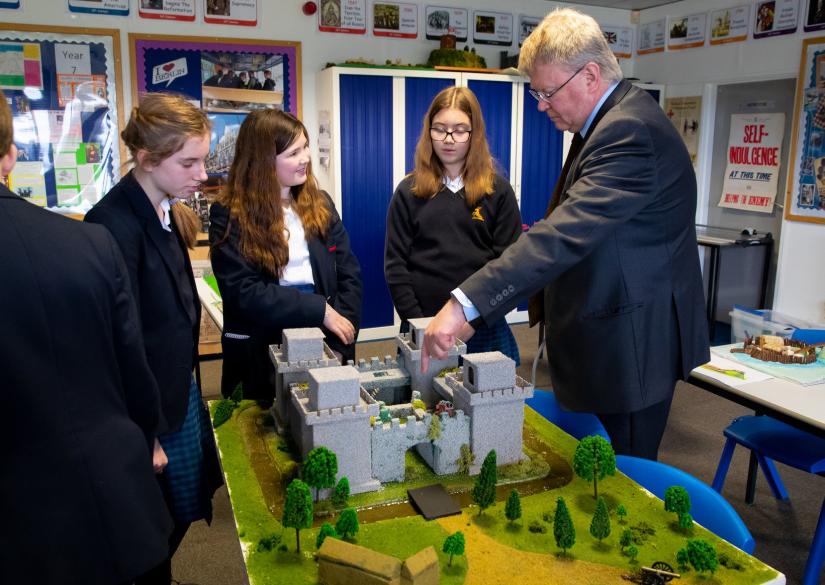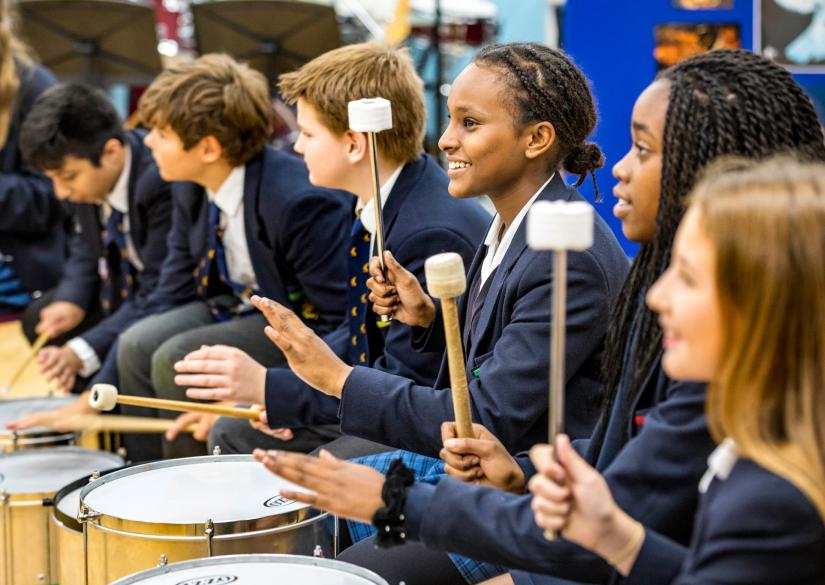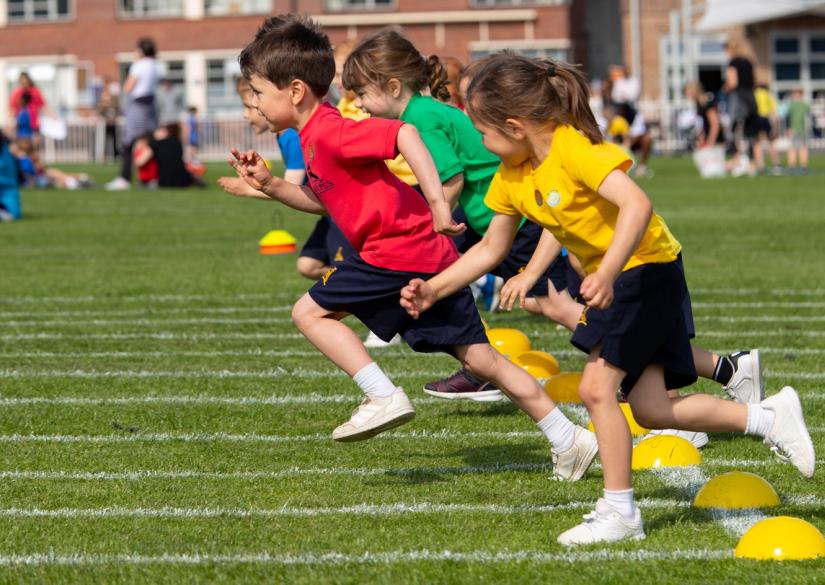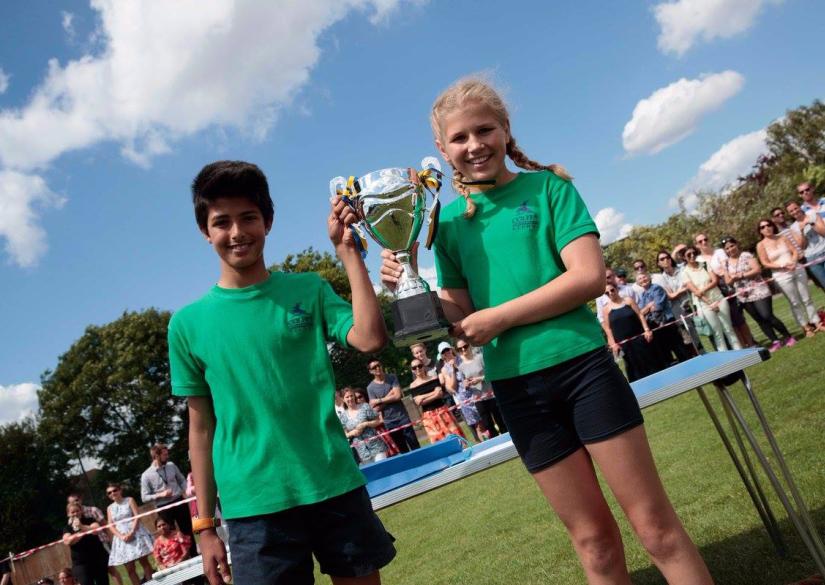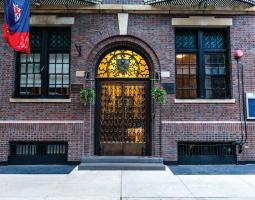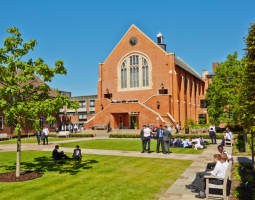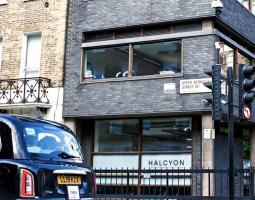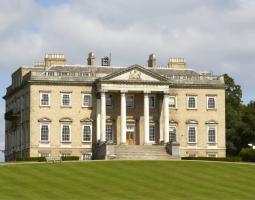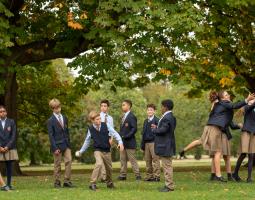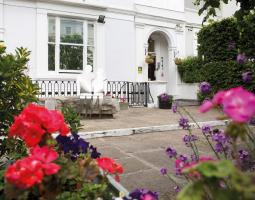Colfe's Private School
Programs and prices, tuition fees in Colfe's Private School
Junior School: Early Year Programme&Key Stage 1
- Age of students - from three years,
- The period of study is four years.
Junior school covers two educational stages: the preparatory department and grades 1-2.
At the age of three to five years, children are studied according to a preparatory program that helps them adapt to a new environment, get acquainted with the world around them, and interact in a team. Gradually, they gain self-confidence and develop in a warm, friendly and caring environment where they feel safe, unique and appreciated. Through a specialized play-based curriculum, educators create a rich learning environment, providing children with developmental opportunities both indoors and outdoors. The curriculum necessarily includes lessons in music, physical education and swimming. Students also participate in weekly classes at the Forest School, giving them the opportunity to learn while exploring the environment and developing an understanding of the natural world.
In grades 1-2, students begin to study all subjects of the National Curriculum, building on the skills, knowledge, understanding, and experience gained during their time in kindergarten. Homework is set once a week, includes math tasks and spelling practice. Gradually, the tasks begin to become more complicated, preparing pupils for the transition to the next stage of school education.
Junior School: Key Stage 2, Junior School: Grades 3-6
- Age of students - from seven years,
- The period of study is four years.
The educational process for grades 3-6 focuses on three aspects of each child's development – talent, potential, and character. The academic program includes daily lessons in subjects such as:
- English language
- Mathematics
- Science
- Art, Design & Technology,
- Humanities
- Computer Engineering,
- Modern languages,
- Music
- Physical education
- Personal, social development and medical education.
In addition to a rich curriculum, there are music lessons, sports sections, creative clubs and other areas of extracurricular activities.
More than 50% of the schedule at the Key Stage 2 stage is taught by the class teacher, the rest of the disciplines are taught by specialist teachers. Daily homework is introduced gradually, preparing children to manage their time responsibly, laying the foundations for effective independent learning for the transition to high school.
Senior School
- Age of students – from 12 years old,
- The period of study is five years.
The high school program provides students with an extensive list of subjects so that each student can gain interdisciplinary knowledge, be able to apply it in life, and choose the most interesting subjects. For five years, from grades 7 to 11 inclusive, students will attend classes in such disciplines as:
- Creative Arts, Design,
- Informatics
- Drama
- English language
- Geography
- History
- Modern languages,
- Mathematics
- Music
- Physical education
- Religion, philosophy,
- Natural sciences: biology, physics, chemistry.
Subjects are taught by specialist teachers who provide personal support for all students. Teachers organize additional classes to analyze complex topics, deepen knowledge if necessary.
Extracurricular activities allow students to develop their talents and abilities outside of the classroom. Sports sections, creative circles, hobby clubs, field trips balance a strict academic program, ensuring a balance between study and rest.
Sixth Form, Graduating Classes
- Age of students – from 16 years old,
- The period of study is two years.
The Sixth Form stage is an academically rigorous curriculum lasting two years, during which students will study subjects that are interesting to them.
Students begin Year 12 with the study of four subjects, continuing in Year 13 with the study of all four or three of them:
- Art, Design, Photography, 3D Design,
- Business
- Classic
- Informatics
- Drama
- Economics
- English language
- Geography
- History
- Mathematics
- Media Studies,
- Modern languages,
- Music
- Politics
- Religion, philosophy.
The first year of the Sixth Form culminates in the Goldsmiths Colfe's Midterm Exam (GCiE), which is the result of a close collaboration between Colfe's School and Goldsmiths, the University of London and is registered with UCAS. GCiE encourages the extensive academic development of students, the conscious choice of subjects for passing the A-Level, which awaits pupils at the end of the 13th grade. Students in their final year of study are also given the opportunity to complete an Extended Project Qualification (EPQ), which is an independent research paper.
Each student can count on individual support from the class teacher, personal tutor. Tutors monitor academic progress, guide students as they progress through the Sixth Form, and provide advice on applying to university.
Description of Colfe's Private School
- Location: London, England,
- Founded in: 1652,
- Number of students: about 1,300,
- Language of instruction: English,
- Type of studying: mixed.
Colfe's School is a day school for students aged from 3 to 18 years old, located in southeast London.
More than 350 years of work of Colfe's School are full of the maintenance of historical traditions, a strict attitude to consistent education, and modern teaching methods, a wide variety of opportunities for the comprehensive development of students. Throughout its history, Colfe's School has tried to support innovative trends in the world of education, thereby earning the respect not only of local families, but also of ranking agencies.
A balanced academic program at every stage of study, extracurricular sports and creative areas, comprehensive support from teachers and administrative staff provide students with the best conditions for achieving success both in their studies and in personal development. The academic results of graduates annually confirm the success of the programs — almost all high school students enter leading universities around the world. To support students at every stage of schooling, appropriate departments have been created to assist in the process of adapting to a new learning environment, personalizing the academic plan, choosing a university and applying to it. Students can also rely on additional support in subjects, in learning English - teachers offer extracurricular hours of individual lessons to support each student, provide more in-depth knowledge or analyze a difficult topic.
Through partnerships with local schools and organizations, Colfe's School students have the opportunity to plan their future before graduation. On the basis of partnerships, students are invited to participate in external events: from sports competitions, music concerts to charity events, scientific seminars. Some specialized partner colleges offer scholarships to successful students to continue their academic path.
Educational process
Colfe's School has specialized departments that provide comprehensive support to everyone. From preschool groups to Sixth Form, teaching staff provide an individual approach to any issues, offering academic, psychological, and career assistance.
The Career Development Service provides personalized guidance on university applications, career counseling, helping each student reach their potential. In the Sixth Form phase, such support is very important, as each student has their own strengths, interests, and goals for the future.
Another feature of the educational process is the Forest School, located on campus: outdoor classes are held here, contributing to the study of the environment and one's abilities. The Forest School is available to students from preschool through middle school.
Faculties and colleges
Colfe's School teaches a full cycle of school education, including preschool, elementary, middle and high school.
Things to know about
The use of cell phones during the school day is prohibited for all students except Sixth Form students. Bringing Surface technology to all high school students means they can use the internet for educational purposes on a device that is considered safe thanks to the school's filtering and monitoring systems.
If parents choose a mobile phone for their child, the staff strongly recommends traditional models through which children can make calls and send/receive text messages, but not much else.
- Primary school students are not allowed to use mobile phones and other electronic devices,
- Students in grades 7-11 should turn off their phones during the day, keep them out of sight at all times,
- Sixth Form students may only use telephones in designated areas.
Accommodation, meals, prices
Colfe's School provides full-time programs only and does not have residencies.
Lunches are served daily to all students, prepared according to a balanced menu with healthy products of local origin. The team of chefs purchases seasonal fruits and vegetables, regularly changing the list of dishes to diversify the diet of Colfe's School students. During breaks between classes, students have access to a cafeteria with healthy snacks and drinks.
Activities Colfe's Private School
For each school department, an extracurricular program is provided, including various types of art, sports, thematic interest clubs. Areas of activity can overlap between age groups, ensuring the gradual development of the child's skills from year to year.
The performing arts are represented in several areas: choir, orchestra and ensembles that regularly rehearse productions, play at school concerts, participate in external events. Most students attend individual lessons of playing musical instruments every week: guitar, ukulele, orchestral instruments. In addition to musical groups, members of drama clubs also participate in regular concert events. Whether a student is interested in acting, costumes, sets, sound, or lighting, there is a role for everyone! In recent years, the school's Beardwood Theatre has shown productions such as The Secret Diary of Adrian Mawle, Two, The Real Inspector Hound, A Midsummer Night's Dream, and Romeo and Juliet. Students at Colfe's School are invited to learn new skills at theatre companies such as Frantic Assembly, Punchdrunk and Splendid Theatre, who frequent the school for performances, interactive workshops. Pupils can audition for the National Youth Theater of Great Britain - over the past seven years, 26 students of Colfe's School have taken part in its events.
Other art forms are represented by weekly art and photography clubs. Students have access to modernly equipped specialized studios, equipment that will help to develop their talent to the fullest. An annual exhibition of art and photography is organized in June.
Sport plays an important role in the educational process of each department and in extracurricular life. With Colfe's School's diverse sports facilities, students will be able to try their hand at a variety of sports:
- Netball
- Rugby
- Hockey
- Soccer
- Cricket
- Swimming
- Volleyball
- Gymnastics
- Cross-country running,
- Biathlon
- Athletics
- Tennis.
Sports sections are conducted seasonally, offering students new activities each semester. At the same time, there are also permanent areas, the national teams in which participate in city and regional competitions, winning awards.
Thematic clubs focused on the development of individual qualities and interests of students work in the afternoon. Students have the opportunity to immerse into the study of their hobby, find like-minded people, try new activities:
- Chess
- Debate
- Filmmaking
- Drawing
- Board games,
- Calligraphy
- 3D printing,
- Japanese
- Music Technology,
- Dancing
- Philosophy
- Literature
- Creativity in LEGO,
- Robotics
- DJ club.
Exciting activities are not limited by the educational territory of Colfe's School - students participate in excursions to local attractions, the countryside, they can visit West End theaters, historical museums, exhibition halls with regularly changing exhibitions, key places in London.
Advantages
- More than 350 years of educational activity,
- Outstanding exam results: 79% of GCSE students achieve 9-7 grades, 87% of A-Level students achieve A*-B grades,
- High acceptance rate at top universities around the world,
- According to the results of the inspection by the Independent School Inspectorate, ISI Colfe's School received excellent marks in the areas of teaching, inclusivity towards students, modernity of the campus,
- Cooperation with local schools, organizations to provide scholarships to students, share knowledge, conduct events,
- An individual approach to the comprehensive development of each student,
- Qualified teaching staff providing support not only during classes but also outside the classroom,
- Special conditions for the use of telephones on campus.
Facilities and equipment at Colfe's Private School
Colfe's School is located in Horn Park, southeast London. The extensive campus offers students not only modern classrooms for studying, but also a large green area for walking, outdoor sports grounds, a Forest School for the little ones.
Each department, whether preschool or senior, has its own building. Lecture classes, subject science laboratories, computer rooms and a library offering printed literature and access to electronic databases have been prepared for students. Younger pupils have access to outdoor playgrounds, and older pupils have access to a variety of sports infrastructure: a sports center with a full-size swimming pool, two training areas, green areas for small group classes.
There are also specialized centers on campus, for example, the Center for the Performing Arts, where creative studios, a rehearsal and performance hall, dressing rooms, music rooms and other rooms focused on the development of creative skills are equipped.
The academic territory of Colfe's School is completely safe: there is round-the-clock security on campus, the area is fenced, and there is a pass regime.
Admission dates and extra charges
The academic calendar consists of three semesters:
- Autumn: September-December,
- Spring: January-March,
- Summer: April-July.
Between semesters, holidays are organized: Christmas, Easter and summer. Rest is also provided on weekends and days of national and international holidays. Studying takes place on weekdays: from Monday to Friday, in the morning and at lunchtime, lessons are followed by activities in sports and creative circles, thematic clubs, and attending events.
Staff provide care for the youngest children before and after school. The breakfast club is open every morning - children can come to campus from 7:30 in the morning and have breakfast before classes. The after-school club is engaged in comprehensive education of students until 18:00 - students are supervised in classrooms or on the playground, can do homework under supervision.
The price includes tuition fees, basic stationery, materials and textbooks, library books and activities such as the orchestra and choir, as well as most extracurricular activities, includes a subscription to the Parents' Association and an accident insurance contribution. Approximate list of additional costs includes:
- Registration fees,
- Nutrition
- Some extracurricular activities,
- Individual academic support,
- Additional care for children during free time,
- Personal expenses.
Enrolment process
Applicants will have to go through several entrance stages:
- Submission of an online application, payment of application fees,
- Passing interviews, assessment tests in mathematics, English,
- Obtaining an official invitation,
- Arrive on campus to start classes.
Admissions officers provide all the recommendations, supporting candidates at every stage of admission, they are always ready to contact parents.
Perspectives
The vast majority of Colfe's School graduates go on to higher education, whether a university or a specialist college in the UK or abroad. In 2024, 95% of graduates were admitted to their chosen university, including Oxford and Cambridge, Medical College, Imperial College, and Russell Group universities.
Entry requirements, how to apply, what is required to enrol
Admission is organized at every stage of study – students must be 3+, 11+ or 16+ years old to enroll in the relevant program. Regardless of the level of the program, for admission, future pupils must provide:
- Personal documents including health insurance, identity card,
- Academic certificates from the previous place of study, report cards.
Instruction takes place in English, so students need age-appropriate speaking skills.
Scholarships Colfe's Private School
Colfe's School offers several types of financial and scholarship support. Awards are at the discretion of the school and the number varies annually. Scholarships based on academic merit usually offer a 10% to 50% discount, sports and creative scholarships from 10% to 20%; Financial assistance based on a means test can be up to 100% of the annual cost.
Institution on the map
Residence permits, citizenship and other services
- Guardianship services during the studies
- Student supervision
Review about Colfe's Private School
Recommendations on when to apply
| Language courses, schools and children's language camps | Primary and secondary education - private schools | Preparation programmes for entering universities - higher education | Higher education (after completing accredited programs A-level, IB, High School) - Bachelor, Master, MBA |
| - we recommend to apply 6-9 months before the start of the course (some camps and schools offer discounts for early booking or for lengthy study programs) - there are some very popular and high demand children's camps, where the applications need to be submitted 1 year in advance (in particular Switzerland , Great Britain , USA , Canada , Austria) | - we recommend to apply one year before the start of the training program, - some schools have a specific time frame (September-November - please specify an individual school) - some schools require tests in several stages (UKISET, internal tests of the school: English, mathematics, logics, subjects, interview, some require a personal visit) | - we recommend to apply one year before the start of the program, - for Foundation and Pathway programs, IELTS and TOEFL certificates are usually required, respectively | - recommended submission one year before the start of the program, - the deadline normally closes in January, for TOP HEIs and, as a rule, in March in other universities - for a bachelor, a Foundation or Pathway preparatory program a completed A-level, IB, High School + IELTS / TOEFL are required - for Masters you need a graduated higher education, in some cases you need a pre-Masters program - MBA requires completed higher education, work experience preferably at least 2-3 years, etc. |


